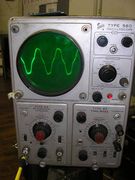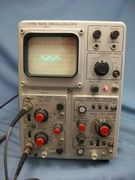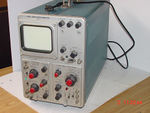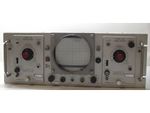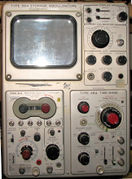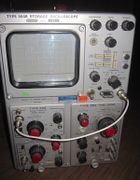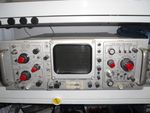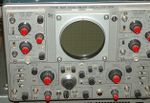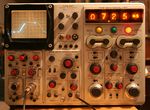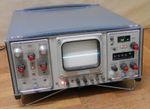560-series scopes
The 560 series of mainframes includes the 560, 506, 561, 564, 565, 567, and 568. They were introduced with the 560 and 561 in 1961. These seven oscilloscope mainframes have the following in common:
- They accept 560-series plug-ins (the 567 additionally accepts the 6R1 or 6R1A plug-ins)
- They have linear power supplies (exception: the 560 power supply is basically a switch-mode power supply)
- They require the plug-ins to drive the CRT vertical and horizontal deflection plates directly (exception: the 565, which includes built-in trigger, timebase, and horizontal amplifier circuitry)
- They don't use post-deflection acceleration of the CRT beam
- They were introduced between 1961 and 1967
- They don't contain a vertical delay line (some plug-ins, e.g., the 3A6 have built-in delay lines so the rising edge of fast pulses with low repetition rate can be seen)
560-series plug-ins includes the 2-series models (e.g., the 2A60 and 2B67) and the later, more power-hungry 3-series models (e.g., the 3A1 and 3B3). The 3-series plug-ins consume more power than the power supply in the 560 and 561 can deliver, The 560 and 561 are only for use with 2-series plug-ins; 3-series plug-ins consume more power than the 560 and 561 can supply. When the 561A replaced the original 561, one of the benefits it brought was a power supply capable of meeting the current demands of 3-series plug-ins.
Having the vertical and horizontal deflection amplifiers in the plug-ins rather than in the mainframe has pros and cons.
Pro:
- Lower cost for an entry-level configuration. No need for expensive high-speed amplifiers anywhere in the system.
- Bandwidth can be upgraded later by adding faster plug-ins.
- Replacing plug-ins has a high likelihood of fixing problems, unless there is a problem in the power supply or CRT.
- A small number of mainframe models can support a wide range of applications.
Con:
- Checking calibration after changing plug-ins is recommended. The signal path of the plug-in to mainframe interface is not as well standardized as it is on 500-series scopes or 7000-series scopes. This is primarily due to variability in deflection sensitivity of CRTs.
- Since each plug-in contains deflection amplifiers, 560-series plug-ins cost more than a plug-in with equivalent functionality for a mainframe that has built-in deflection amplifiers. The cost of the deflection amplifiers adds up if the customer wants several different plug-ins at the high-speed end of the 560-series range.
Early 560-series mainframes (e.g., the 561) had tubes in the low voltage power supply and in the high voltage power supply. Later scopes in the series (e.g., the 561B and 568) were all solid state except for the CRT.
-
560 - Basic mainframe (1961)
-
561 (1961)
-
561A (1962)
-
561B - Solid state scope (1969)
-
564 - Storage scope (1962-1968?)
-
RM564 - Storage scope (1962-1968?)
-
565 - Dual-beam scope, two plug-ins; built-in trigger, sweep, and horizontal amplifier (1963)
-
568 - Sampling scope (1967)
